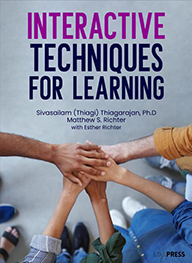Teaching Presence in a Higher Education Asynchronous Online Classroom
The presence of faculty facilitates the social and cognitive engagement of learners, which in turn can support student learning and academic success
| To leave a comment you must sign in. Please log in or create an ACM Account. Forgot your username or password? |
|
Create an ACM Account |
This article introduces a comprehensive examination of MOOCs, highlighting their potential to significantly reshape educational access and quality.

Challenging the misconceptions about interactive learning, this book grounds interactive strategies in cognitive science.

Efficient online teaching strategies so you can stop wasting time and focus on quality interactions with your students.

Potential benefits and challenges are: enhanced teaching practices, personalized learning promotion, data privacy, and misinformation.

Feedback is important regardless of the learning environment, but depending on the environment, the methods and processes instructors use matter.

While JiTT improves engagement and learning outcomes, it requires careful time management and adequate technology access for students.

Nine steps to achieve potential time-saving benefits using GenAI to create diverse training content.

Discussion forums facilitate student and faculty interactions and are a space to effectively and efficiently reflect on course topics.

In this interview, Richter discusses his work in immersive technologies and ponders what the future holds for e-Learning.

A mastery learning model can be implemented to create a systematic and sustainable framework for teachers and students.

As generative artificial intelligence (GenAI) tools become increasingly accessible, higher education institutions must address the challenge of maintaining academic integrity while preparing students for an AI-integrated future. Institutions that rely solely on AI-detection software risk fostering adversarial learning environments due to false positives and a punitive culture. Instead, a comprehensive approach that integrates AI literacy with institutional policy can foster ethical engagement with AI. Drawing on recent literature and best practices, this article examines the limitations of detection tools.

As demand for online courses continues to rise in higher education, many institutions struggle to develop, promote, and sustain high-quality online programs, in part due to limited capacity. In response, Online Program Managers (OPMs), private companies that collaborate with colleges and universities to create and provide online offerings, have become increasingly prominent over the past 15 years. These partnerships allow institutions to scale online courses and programs without having to contribute significant upfront investments. However, there remains a general lack of awareness about what OPMs are, the scope of their services, and the trade-offs involved. This article aims to shed light on the advantages and potential drawbacks of OPM partnerships.